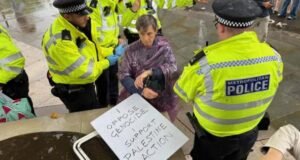
Sir Keir Starmer has pledged to scrap the government’s Rwanda scheme “straight away” if his party wins the election.
The Labour leader said he would use money saved to hire specialist investigators to tackle small boats crossing the Channel.
He also wants to use counter-terror powers to “smash” people smuggling gangs.
Rishi Sunak said ditching his Rwanda plan would “open up our borders”.
Speaking to broadcasters, the prime minister said the government had already recruited extra police officers to tackle small boats.
Sir Keir unveiled new details of his plan in Dover alongside local MP Natalie Elphicke, who defected from the Tories to Labour on Wednesday.
In a brief speech, Ms Elphicke took a shot at her former boss, claiming “nowhere is Rishi Sunak’s lack of delivery clearer than on the issue of small boats”.
In his speech, the Labour leader said he will establish a new Border Security Command to work with Border Force, MI5 and the National Crime Agency on prosecuting gangs operating small boat routes.
The party says this new unit would be led by a former police, military or intelligence chief, who would report directly to the home secretary.
Sir Keir argued that scrapping the Rwanda scheme would free up £75m in the first year of a Labour government to hire hundreds of extra investigators and “intelligence agents”.
He has already pledged to cancel the government’s plan to send some asylum seekers to Rwanda, which was passed into law last month and is due to begin by mid-July.
The government says the scheme will act as a deterrent to people smugglers and people attempting to cross the Channel illegally – but Labour argues it will not do this and is a waste of money.
Pressed on when this would happen, he told reporters Labour would “get rid of the policy straight away”.
“I’m not going to continue a policy I don’t think is going to work, which is going to cost a fortune,” he added.
No deportation flights have taken off yet as the scheme has been delayed by legal challenges.
When pushed on how large a reduction in small boat crossings he would like to see, the Labour leader did not set a figure but said he wanted levels to come down “dramatically”.
“We will restore serious government to our borders, tackle this problem at source and replace the Rwanda policy permanently,” he added.
Sir Keir also said his party would expand powers under the Blair-era Terrorism Act to enable police to search people suspected of being involved in people smuggling.
There would also be new powers enabling “live monitoring” of their financial accounts and court orders to hand over financial information.
Suspected smugglers could also see their access to the internet, banking and travel restricted.
Labour says these new powers would require fresh legislation to be passed in Parliament – something Sir Keir insisted would happen “very quickly”.
Peter Walsh, from Oxford University’s Migration Observatory, said Labour’s scheme was “unlikely to be a game changer”.
The plan “appears on the face of it to be pretty similar” to the current Small Boats Operational Command – the new military-led force which monitors and intercepts vessels attempting unauthorised entry into the UK via the Channel, he told BBC News.
“The devil will be in the detail,” he added.
Both the Conservatives and Labour have accused each other of creating an “amnesty” – generally understood to mean allowing all those entering the country illegally to stay with a full legal pardon.
Labour’s plans, which the Conservatives have dubbed an “amnesty for illegal immigrants”, will allow those arriving in the UK on small boats to apply for asylum – which is currently banned under the Illegal Migration Act.
Labour have repeatedly denied they have plans for an amnesty on those entering the country illegally.
Sir Keir accused the Conservatives of “a Travelodge amnesty” by not processing asylum claims and housing people in hotels instead – though the plans do not amount an amnesty either as they involve deporting asylum seekers to Rwanda.
Nearly 9,000 people have crossed the English Channel in small boats so far this year, provisional Home Office figures show.
This is up almost a third (32%) on the same period last year, when 6,691 people made the crossing, and a 14% rise compared with the same period in 2022 when the number of people was 7,750.
 Weekly Bangla Mirror | Bangla Mirror, Bangladeshi news in UK, bangla mirror news
Weekly Bangla Mirror | Bangla Mirror, Bangladeshi news in UK, bangla mirror news







